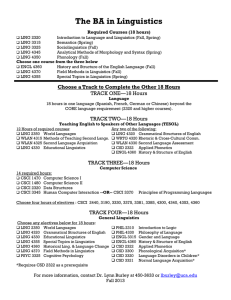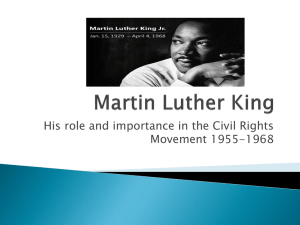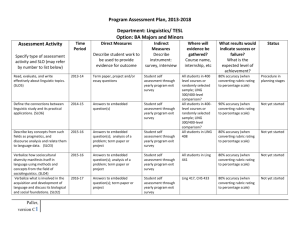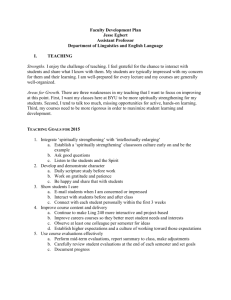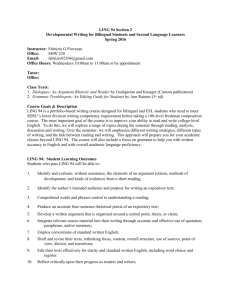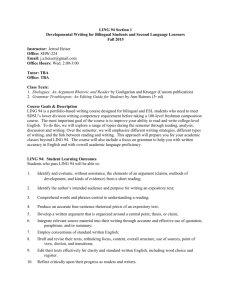LINGUISTICS COURSE OFFERINGS 2014
advertisement
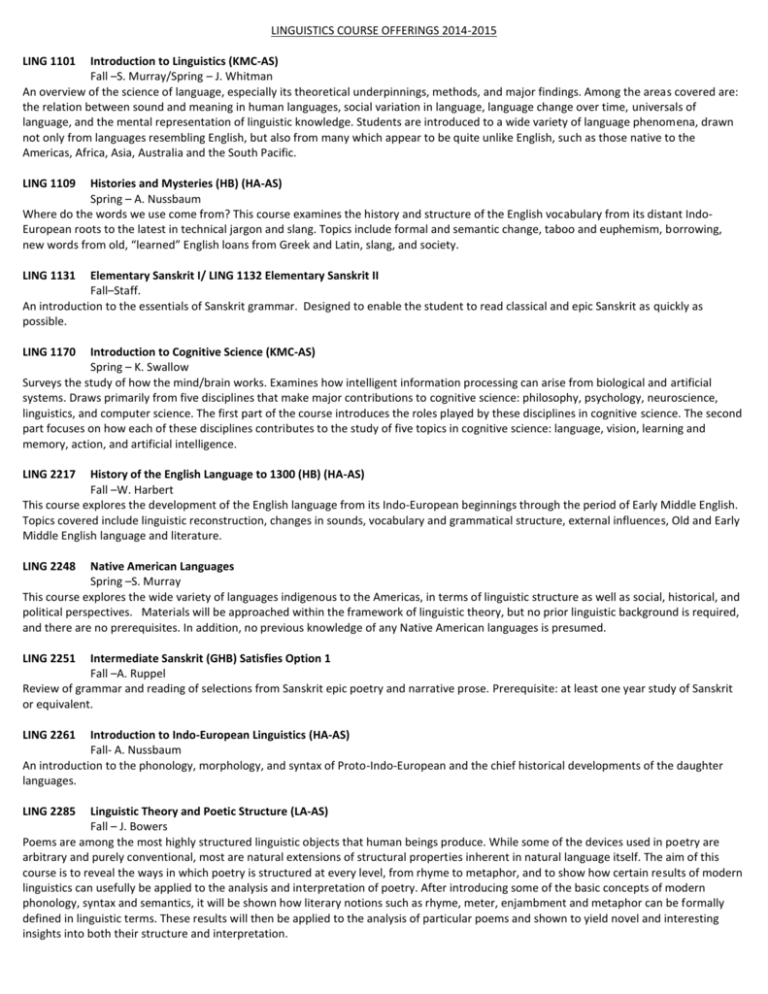
LINGUISTICS COURSE OFFERINGS 2014-2015 LING 1101 Introduction to Linguistics (KMC-AS) Fall –S. Murray/Spring – J. Whitman An overview of the science of language, especially its theoretical underpinnings, methods, and major findings. Among the areas covered are: the relation between sound and meaning in human languages, social variation in language, language change over time, universals of language, and the mental representation of linguistic knowledge. Students are introduced to a wide variety of language phenomena, drawn not only from languages resembling English, but also from many which appear to be quite unlike English, such as those native to the Americas, Africa, Asia, Australia and the South Pacific. LING 1109 Histories and Mysteries (HB) (HA-AS) Spring – A. Nussbaum Where do the words we use come from? This course examines the history and structure of the English vocabulary from its distant IndoEuropean roots to the latest in technical jargon and slang. Topics include formal and semantic change, taboo and euphemism, borrowing, new words from old, “learned” English loans from Greek and Latin, slang, and society. LING 1131 Elementary Sanskrit I/ LING 1132 Elementary Sanskrit II Fall–Staff. An introduction to the essentials of Sanskrit grammar. Designed to enable the student to read classical and epic Sanskrit as quickly as possible. LING 1170 Introduction to Cognitive Science (KMC-AS) Spring – K. Swallow Surveys the study of how the mind/brain works. Examines how intelligent information processing can arise from biological and artificial systems. Draws primarily from five disciplines that make major contributions to cognitive science: philosophy, psychology, neuroscience, linguistics, and computer science. The first part of the course introduces the roles played by these disciplines in cognitive science. The second part focuses on how each of these disciplines contributes to the study of five topics in cognitive science: language, vision, learning and memory, action, and artificial intelligence. LING 2217 History of the English Language to 1300 (HB) (HA-AS) Fall –W. Harbert This course explores the development of the English language from its Indo-European beginnings through the period of Early Middle English. Topics covered include linguistic reconstruction, changes in sounds, vocabulary and grammatical structure, external influences, Old and Early Middle English language and literature. LING 2248 Native American Languages Spring –S. Murray This course explores the wide variety of languages indigenous to the Americas, in terms of linguistic structure as well as social, historical, and political perspectives. Materials will be approached within the framework of linguistic theory, but no prior linguistic background is required, and there are no prerequisites. In addition, no previous knowledge of any Native American languages is presumed. LING 2251 Intermediate Sanskrit (GHB) Satisfies Option 1 Fall –A. Ruppel Review of grammar and reading of selections from Sanskrit epic poetry and narrative prose. Prerequisite: at least one year study of Sanskrit or equivalent. LING 2261 Introduction to Indo-European Linguistics (HA-AS) Fall- A. Nussbaum An introduction to the phonology, morphology, and syntax of Proto-Indo-European and the chief historical developments of the daughter languages. LING 2285 Linguistic Theory and Poetic Structure (LA-AS) Fall – J. Bowers Poems are among the most highly structured linguistic objects that human beings produce. While some of the devices used in poetry are arbitrary and purely conventional, most are natural extensions of structural properties inherent in natural language itself. The aim of this course is to reveal the ways in which poetry is structured at every level, from rhyme to metaphor, and to show how certain results of modern linguistics can usefully be applied to the analysis and interpretation of poetry. After introducing some of the basic concepts of modern phonology, syntax and semantics, it will be shown how literary notions such as rhyme, meter, enjambment and metaphor can be formally defined in linguistic terms. These results will then be applied to the analysis of particular poems and shown to yield novel and interesting insights into both their structure and interpretation. LING 3302 Introduction to Phonetics and Phonology (KCM-AS) Spring – S. Tilsen This course is an introduction to phonology, which studies the patterning of speech sounds in human language. Emphasis will be on formal devices, such as rules and representations, which capture the internal organization of speech sounds as well as their grouping into larger units, syllables, and feet. Prerequisite: LING 1101 or permission of instructor. LING 3303 Introduction to Syntax and Semantics (KCM-AS) Fall –M. Despic An introduction to syntax, which studies how words are combined to form phrases and sentences. The course aims to give students the ability to address questions regarding the syntactic properties that are shared by natural languages (as well as those that distinguish them) in a precise and informed way. The topics covered include those that lie at the heart of theoretical syntax: phrase structure, transformations, grammatical relations and anaphora. Emphasis throughout the course is placed on forming and testing hypotheses. Prerequisite: LING 1101 or permission of instructor. LING 3308 Readings in Celtic Languages Fall– W. Harbert Reading/discussion groups in Welsh or Scottish Gaelic. Prerequisite: permission of instructor. LING 3314 Introduction to Historical Linguistics (HB) (HA-AS) Spring –M. Weiss Survey of the basic mechanisms of linguistic changes, with examples from a variety of languages. Prerequisite: LING 1101 or permission of instructor. LING 3315/3316 Old Norse Fall/Spring – B. Stefánsdóttir Study of the linguistic structure of Old Norse, with extensive reading of Old Norse texts. The structure of Old Norse (Old Icelandic), phonology, and morphology, with reading of selections from the Prose-Edda, a thirteeth-century narrative based on the Edaic poetry. Spring: Extensive reading of Old Norse texts, among them selections from some of the major Icelandic family sagas: Nijals saga, Grettis saga, and Egils saga, as well as the whole Hrafnkels saga. LING 3321 History of Romance Languages I (HA-AS) Fall – T. Alkire The Romance languages are the lasting imprint of all that happened to the Latin language as it moved through time, territories, and people of many ethnicities. While the Latin of antiquity retained its prestige in high culture, the natural untutored usage of ordinary people was always free to go its own way. This course covers the following topics, selected to create a panoramic view: Formation of the general Romance seven-vowel system from Latin. Early and widespread sound changes in popular Latin. Finding and interpreting evidence for trends in popular Latin pronunciation. The comparative method and its limitations. Essential later sound changes, some of which create a whole new order of consonants unknown to Latin but conspicuous in Romance. Nouns and adjectives from Latin to Romance. Formation of the present indicative: the competing forces of sound change and analogical adjustment. A brief overview of Portuguese. Variants of the seven-vowel system. Salient features of Romanian. Factors that helped shape the vocabulary of Romance. Medieval diglossia. Emergence of Romance vernaculars newly recognized by their speakers as languages distinct from Latin and from each other. Close analysis of the oldest surviving document written unmistakably in Romance (842 C. E.). Prerequisites: a 2000-level (or higher) course in any Romance language, and some familiarity with a second one or with Latin. LING 3322 History of Romance Languages II (HB) (HA-AS) Spring – T. Alkire Further study of historical developments in the Romance languages will be interleaved with readings of significant Romance texts from the 9th to 13th centuries, both notarial and literary. Topics covered include: More on medieval diglossia and scribal practices. How medieval glosses bear on the study of early Romance. Losses and innovation in the Romance lexicon. Formation of three high-frequency irregular verbs: be, have, and go. Raising and yod effects in Spanish and Italian, yod metathesis in French. Verb morphology from Latin to Romance with emphasis on the synthetic past, the periphrastic past and future, newly created past participles, and the conditional mood. Students will become acquainted with the resources for studying medieval documents and produce an annotated translation of an excerpt from a pre1400 Romance text as a final project. Prerequisite: ROMS 3210 or permission of instructor. LING 3390 Independent Study in Linguistics Fall/Spring –Staff Independent study of linguistic topics not covered in regular curriculum for undergraduates. Permission only. LING 4310 Topics in Cognitive Science – Topic: Consciousness and Free Will Fall - S. Edelman, H. Segal. This advanced seminar will examine creativity in a wide range of settings and disciplines. We shall read about and discuss examples and invoke concepts from animal behavior, human psychology and literary theory, and computational theory and modeling. Prerequisite: COGST 3140 or COGST 6140. LING 4401 Phonology I (KCM-AS) Fall – D. Zec Provides an introduction to phonological theory. The empirical basis, theoretical approaches, and relevant literature are explored through extensive data analysis and critical reading. Prerequisite: LING 3302 or equivalent. LING 4403 Syntax I (KCM-AS) Fall – M. Despic An advanced introduction to syntactic theory within the principles and parameters/minimalist frameworks. The topics covered include phrase structure, argument structure (unaccusative verbs, unergative verbs, double object constructions), principles of word order, and the binding theory. Prerequisite: LING 3303 or permission of instructor. LING 4411 History of Japanese Language - (GHB) (HA-AS) Fall – J. Whitman Overview of the history of the Japanese language followed by intensive examination of issues of interest to participants. Students should have reading knowledge of Japanese. Prerequisite: reading knowledge of Japanese. LING 4419 Phonetics I (KCM-AS) Spring –S. Tilsen Provides a basic introduction to the study of phonetics. Topics to be covered include anatomy and physiology of the speech production apparatus, transcription and production of some of the world's sounds, basic acoustics, computerized methods of speech analysis, acoustic characteristics of sounds, speech perception, speech synthesis, stress and intonation. Prerequisite: LING 3302 or permission of instructor. LING 4421 Semantics I (KCM-AS) Fall – S. Murray. This course introduces methods for theorizing about meaning within generative grammar. These techniques allow us to create grammars which pair syntactic structures with meanings. We will look at several empirical areas in detail, among them complementation (combining heads with their arguments), modification, conjunction, definite descriptions, relative clauses, traces, bound pronouns and quantification. An introduction to logical and mathematical concepts used in linguistic semantics (such as set theory, functions and their types, and the lambda notation for naming linguistic meanings) is included in the course. Prerequisite: LING 3303 or permission of instructor. LING 4423 Morphology (KCM-AS) Spring – M. Despic This course addresses the basic issues in the study of words and their structures. It provides an introduction to different types of morphological structures with examples from a wide range of languages. Special emphasis is given to current theoretical approaches to morphological theory. Prerequisite: LING 3302, LING 3303 or permission of instructor. LING 4424 Computational Linguistics (MQR) Fall – M. Rooth Computational models of natural languages. Topics include tree syntax and treebank databases; broad-coverage probabilistic grammars; finite state generative phonology; computational semantics; computational minimalist grammar; finite state optimality-theoretic phonology; Hidden Markov models of acoustic realization; text and speech corpora; lab methods in Unix/Linux environment. Prerequisite: CS 2800 or LING 3302 or LING 3303, or permission of instructor. LING 4425 Pragmatics (KCM-AS) Spring – D.Abusch What is the relationship between what words mean and how they are used? What is part of the grammar and what is a result of general reasoning? Pragmatics is often thought of as the study of how meaning depends on the context of utterance. However, it can be difficult to draw a line between pragmatics and semantics. In this course, we will investigate various topics that walk this line, including varieties of linguistic inference (including entailment, presupposition, and implicature), anaphora, indexicals, and speech acts. Prerequisite: LING 3303 or PHIL 2310, or permission of instructor. LING 4430 Structure of Korean (KCM-AS) Spring – J. Whitman Intensive examination of the syntax and phonology of a non-Indo-European language with the objective of testing principles of current linguistic theory. Prerequisite: KOREA 1102 or linguistics course. LING 4436 Language Development (KCM-AS) Spring – B. Lust A survey of basic issues, methods, and research in study of first-language acquisition. Major theoretical positions in the field are considered in the light of experimental studies in first-language acquisition of phonology, syntax, and semantics from infancy on. The fundamental linguistic issues of universal grammar and the biological foundations for acquisition are discussed, as are the issues of relations between language and thought. The acquisition of communication systems in non-human species such as chimpanzees are addressed but major emphasis is on the child. Prerequisite: at least one course in developmental psychology, cognitive psychology, cognitive development, neurobiology, biology, or linguistics. LING 4440 Undergraduate Seminar in Linguistics –Theme: The Shaping of Modern English Spring – W. Harbert This course is intended as an opportunity for advanced linguistics majors to put to use the analytical skills they have acquired in foundation courses on real world research questions. A seminar theme is identified which is sufficiently broad in scope to encompass problems in all of the major subfields of linguistic analysis, and students are guided by the instructor to individual research topics within its scope which correspond to their individual linguistics interests. The instructional format alternates between group meetings and small group/individual meetings with the instructor. The topic area will change from year to year. Thesis: Old English was a garden variety Germanic language. Modern English, however, is strikingly different typologically from the other members of its genetic family, in the shape of its lexicon, its derivational morphology, its inflectional morphology, and its syntax. These differences arose during a period of apparently rapid linguistic change stretching from the end of the Old English Period through Early Modern English, though with residues that are still being negotiated and debated. The changes in question are well known and well documented, but in many cases their causes and their effects are not well understood, either descriptively or explanatorily, and offer many opportunities for individual contributions to their understanding. Prerequisites: Completion of the foundation courses for the Linguistics major, or permission of the instructor. LING 4451 Greek Comparative Grammar (KCM-AS) Fall - A. Nussbaum. The prehistory and evolution of the sounds and forms of ancient Greek as reconstructed by comparison with the other Indo-European languages. Prerequisite: thorough familiarity with morphology of classical Greek. LING 4455 Greek Dialects (KCM-AS) Fall - A. Nussbaum. An examination of the features of the major dialects of ancient Greek and their historical relationships, with special attention to literary Doric, the Lesbian of Sappho and Alcaeus, Homeric Ionic and the question of “Achaean.” LING 4461 Introduction to Indo-European Linguistics (HA-AS) Fall – A. Nussbaum. An introduction to the phonology, morphology, and syntax of Proto-Indo-European and the chief historical developments of the daughter languages. LING 4474 Introduction to Natural Language Processing Spring –Staff Computationally oriented introduction to natural language processing, the goal of which is to enable computers to use human languages as input, output, or both. Possible topics include parsing, grammar induction, information retrieval, and machine translation. Prerequisite: CS 2210. LING 4491/4492 Honors Research Workshop I/II Fall/Spring – A. Cohn This course will add more structure and guidance to students doing an honors thesis in linguistics. Prerequisite: submission of honors thesis application and permission of Director of Undergraduate Studies. LING 4493/4494 Honors Thesis Research (Undergraduate Majors) Fall, Spring –Staff Ling 4493 may be taken before or after Linguistics 4494, or may be taken independently. Ling 4494 may be taken as a continuation of, or before, Linguistics 4493. LING 6248 Native American Languages Spring –S. Murray This course explores the wide variety of languages indigenous to the Americas, in terms of linguistic structure as well as social, historical, and political perspectives. Materials will be approached within the framework of linguistic theory, but no prior linguistic background is required, and there are no prerequisites. In addition, no previous knowledge of any Native American languages is presumed LING 6285 Linguistic Theory and Poetic Structure (LA-AS) Fall – J. Bowers Poems are among the most highly structured linguistic objects that human beings produce. While some of the devices used in poetry are arbitrary and purely conventional, most are natural extensions of structural properties inherent in natural language itself. The aim of this course is to reveal the ways in which poetry is structured at every level, from rhyme to metaphor, and to show how certain results of modern linguistics can usefully be applied to the analysis and interpretation of poetry. After introducing some of the basic concepts of modern phonology, syntax and semantics, it will be shown how literary notions such as rhyme, meter, enjambment and metaphor can be formally defined in linguistic terms. These results will then be applied to the analysis of particular poems and shown to yield novel and interesting insights into both their structure and interpretation. LING 6314 Introduction to Historical Linguistics (HB) (HA-AS) Spring –M. Weiss Survey of the basic mechanisms of linguistic changes, with examples from a variety of languages. Prerequisite: LING 1101 or permission of instructor. LING 6401 Phonology I (KCM-AS) Fall – D. Zec Provides an introduction to phonological theory. The empirical basis, theoretical approaches, and relevant literature are explored through extensive data analysis and critical reading. Prerequisite: LING 3302 or permission of instructor. LING 6402 Phonology II (KCM-AS) Spring – A. Cohn. Provides further refinement of the issues investigated in LING 6401 with a focus on developing research skills. Prerequisite: LING 6401 or permission of instructor. Prerequisite: LING 6401 and or permission of instructor. LING 6403 Syntax I (KCM-AS) Fall – M. Despic An advanced introduction to syntactic theory within the principles and parameters/minimalist frameworks. The topics covered include phrase structure, argument structure (unaccusative verbs, unergative verbs, double object constructions), principles of word order, and the binding theory. Prerequisite: LING 3303 or permission of instructor. LING 6404 Syntax II (KCM-AS) Spring – M. Diesing A continuation of LING 6403, focusing on syntactic dependencies, including the theory of control, an examination of locality constraints on movement, covert versus overt movement, and the syntax of quantification. The purpose of the course is to develop the background needed for independent syntactic research. Prerequisite: LING 6403 and or permission of instructor. LING 6419 Phonetics I (KCM-AS) Spring –S. Tilsen Provides a basic introduction to the study of phonetics. Topics to be covered include anatomy and physiology of the speech production apparatus, transcription and production of some of the world's sounds, basic acoustics, computerized methods of speech analysis, acoustic characteristics of sounds, speech perception, speech synthesis, stress and intonation. Prerequisite: LING 3302 or permission of instructor. LING 6422 Semantics II Spring – M. Rooth The course uses the techniques introduced in Semantics I to analyze linguistic phenomena including quantifier scope, ellipsis and referential pronouns. Temporal and possible worlds semantics will be introduced and used in the analysis of modality, tense, and belief sentences. The phenomena of presupposition, indefinite descriptions, and anaphora are analyzed in a dynamic compositional framework which formalizes the idea that sentence meaning effects a change in an information state. Prerequisite: LING 4421 or permission of instructor. LING 6423 Morphology (KCM-AS) Spring – M. Despic This course addresses the basic issues in the study of words and their structures. It provides an introduction to different types of morphological structures with examples from a wide range of languages. Special emphasis is given to current theoretical approaches to morphological theory. Prerequisite: LING 3302, LING 3303, or permission of instructor. LING 6600 Field Methods Fall – J. Whitman Elicitation, recording, and analysis of data from a native speaker of an understudied non-Western language. Provides basic experience in linguistic fieldwork. Prerequisites: LING 4401/6401 or LING 3302 and LING 4403/6403 or LING 3303, or permission of instructor. LING 6601 Topics in Phonological Theory Fall –A. Cohn Selected topics in current phonological theory. Prerequisites: LING 4401 and one higher-level phonology course. LING 6603 Research Workshop Spring – M. Diesing Provides a forum for presentation and discussion of ongoing research, and development of professional skills. Participants must enroll in a concurrent independent study with a special committee member, or a relevant workshop. Can be taken more than once. Requirement for second year linguistics graduate students. LING 6604 Research Workshop Fall–D.Zec This course provides a forum for presentation and discussion of ongoing research, and development of professional skills. Participants must enroll in a concurrent independent study with a special committee member, or a relevant workshop. Required of third-year linguistics students. LING 6615 Topics in Semantics Fall - D. Abusch. Selected topics in semantic theory, focusing on recent literature. Prerequisite: LING 4421 or permission of instructor LING 6616 Topics in Syntactic Theory Fall – J. Bowers Examination of recent developments in syntactic theory, including ‘minimalist’ approaches to phrase structure, derivations/representations and the nature of economy conditions, and parametric differences. Prerequisite: LING 4404 or permission of instructor. LING 6633 Language Acquisition Seminar Fall–B. Lust This seminar reviews and critiques current theoretical and experimental studies of first-language acquisition, with a concentration on insights gained by cross-linguistic study of this area. Attention is also given to the development of research proposals. Prerequisite: LING 4436 or equivalent or permission of instructor. LING - 6635 Indo-European Workshop Spring – M. Weiss An assortment of subjects intended for students with previous training in Indo-European linguistics: problems in the reconstruction ProtoIndo-European, topics in the historical grammars of the various IE languages, reading and historical linguistic analysis of texts, and grammatical sketches of "minor" IE languages. Prerequisite: Permission of instructor required. LING 6692 Phonetic Data Analysis Workshop Fall, Spring. The phonetics data analysis workshop provides students with practice in analysis and visualization of phonetic data, using Matlab, R, and Praat. Experiment design and statistical methods are emphasized. LING 7701/7702 Directed Research Fall, Spring - Staff LING 7711 Semantics Seminar Fall, M. Rooth.; Spring, S.Murray Addresses current theoretical and empirical issues in semantics. LING 7714 Phonology Seminar Spring – D.Zec Seminars are offered according to faculty interest and student demand. Recent topics include Speech sounds: their phonetic variability and phonological organization; Aspects of Temporal and Rhythmic Organization of Speech; The interfaces between phonology, syntax and semantics, with a focus on the prosody of clitics. Breadth and Distribution Requirements Historical – (HB), Geographical (non-western proficiency) – (GHB), Mathematics and Quantitative Reasoning (MQR), Cultural Analysis (CA), Historical Analysis (HA), Knowledge, Cognition, and Moral Reasoning (KCM), Literature and the Arts (LA), Physical and Biological Sciences (PBS), Social and Behavioral Analysis (SBA)
